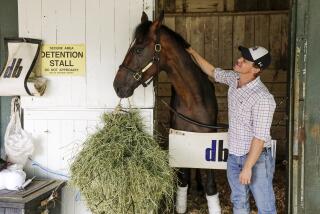Recruiting Probe May Hurt Business
- Share via
COLUMBIA, S.C. — The New York Giants were on the telephone, looking to draft a receiver. That was the day that led to trouble for sports agent William “Tank” Black.
Black was representing the top two receivers in the draft, Ike Hilliard and Reidel Anthony. Both had played at Florida and had lots of good friends -- talented friends--still on the team.
Prodded by an agent they trusted, the Giants took Hilliard with the seventh pick. Nine spots later, Anthony went to the Tampa Bay Buccaneers.
Black helps players like Hilliard and Anthony negotiate lucrative NFL contracts. In return, he expects them to help him recruit other players to his agency. He’s built a multimillion-dollar business using this network of players.
But his sports agency empire is in peril. He’s being investigated amid accusations he illegally recruited players.
Black denies any wrongdoing.
“I tell clients that ... I’m going to do such a great job on their contract that people are going to be writing about it,” he said. “But if I do that, and we make good on all our promises, they’re going to have to help me get other players.”
The NFL Players Assoc. has accused Black of providing cars and money to the players before their college eligibility expired. That would be a crime in Florida, and university police are investigating along with the NFLPA.
Hilliard and Anthony were selected 15 to 20 spots higher than initially projected, Black said. They shared their good experiences with other Florida players, such as Jevon Kearse, Johnny Rutledge, Mike Peterson and Reggie McGrew, all of whom signed with Black two years later.
Rutledge has admitted accepting monthly $500 payments from Black. Rutledge, Kearse, McGrew and Peterson, all questioned in the investigation, have left Black and signed with other agents.
Black started representing players in 1988 after leaving his job as an assistant football coach at South Carolina. His first client was receiver Sterling Sharpe, the best player on the Gamecocks.
His business now includes 37 clients and brings in between $10 million and $15 million a year, Black said. He has two offices in Columbia, one of them with audio and video production rooms to help market his players.
Several agents The Associated Press contacted declined comment on Black, but almost all acknowledged that it’s a cutthroat business in which the line between right and wrong is often blurred.
“You’ve got people going out, starting firms representing athletes, who have no credentials and no clients,” agent Frank Bauer said. “So the question is, How do you get that client? When that starts up, sometimes they feel like they have to induce a client to go to their side. That’s when you get a problem.”
The NFLPA could suspend Black’s license or ban him completely if it determines he is guilty.
“We would not file a complaint on any case unless we believed we had sufficient evidence,” NFLPA lawyer Richard Berthelsen said.
Many others seem surprised Black is in trouble.
“I haven’t seen a crooked sign on his face, or anything crazy like that,” said client Fred Taylor, the Jacksonville Jaguars running back who has been questioned in the case. “He’s too nice a guy to get himself in trouble like that, too smart.”
More to Read
Go beyond the scoreboard
Get the latest on L.A.'s teams in the daily Sports Report newsletter.
You may occasionally receive promotional content from the Los Angeles Times.










